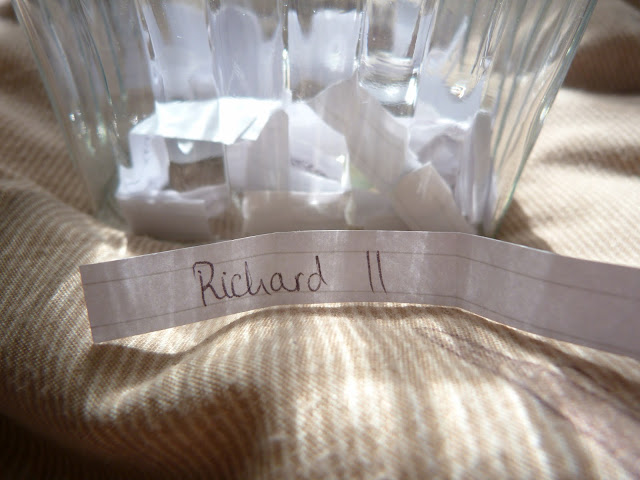#MyPlayToday ... Richard II
First impressions of the draw: Mental image of David Tennant's incredible portrayal, the lingering question of whether they gave him super-subtle breast implants?
Had I read the play before? Yes
Like the erring Bollingbroke, I'm back to the blog after a short, self imposed banishment. Travelling, tutoring, upcoming Masters faff (I've discovered what Shakespeare was up to in all those lost years. He was trying to find student accommodation in Stratford upon Avon) and reading War and Peace have kept me off these keys for now. Particularly the latter; I love the material Tolstoy, but does there have to be so much of it?
Richard II is a play I feel quite familiar with - my DVD of the RSC production is well loved and I had previously read the play in my bid to read them all chronologically (More on why I changed tactics here). It's also an absolute joy for me to read because it appeals to one of my favourite things about Shakespeare; rhythm. The formality of early modern English, the poeticism characteristic of Shakespeare's early works and the sheer volume of plays he produced make Shakespeare a go-to for anyone who, like me, has a bit of a weird thing about rhythm. Lines of speech that dance as you speak them is what unites my love of Shakespeare and rap (was there a whiter sentence ever spoken?).
The all-verse form of this play means it is full of elaborate, poetic lines that really do dance as you speak them. Even in the opening war of threats between Hereford (later Bolingbroke, later Henry IV. Phew.) and Mowbray, rhyming couplets abound. What a fantastic juxtaposition of form and context; to have a pair of noblemen arguing furiously in a tight, regulated iambic pentameter. Or, when I reconsider poetry slams and rap battles, perhaps not such a juxtaposition. Not only do characters harangue each other with jaunty rhythmic rhymes, they finish each other's rhyming couplets. This is one of my favourite phenomena in all of Shakespeare's works; the rhyming couplet split over more than one character.
'Why uncle, thou hast many years to live.'
'But not a minute, King, that thou canst give.'
RII, 1.3.219-220
This kind of form, in my opinion, lives and breathes on stage. It crackles with tension and immediacy and spares no eloquence. That's the good stuff.
Talking of form that comes alive on stage, we get it in spades in this play. Take the Duchess of Gloucester's fragmented trains of thought, which split and explode with contradiction and the sheer confusion of grief. She is so bereft she can hardly speak, but it's not left for the actor to dictate. Her fractured emotions stain the text itself. On the other hand, take York's persistent and sassy word-play. The old man's weapons are his words and he wields them mercilessly on a stage of flowery diction. For example:
'My gracious uncle -'
'Tut, tut! Grace me no grace, nor uncle me no uncle.
I am no traitor's uncle: and that word "grace"
In an ungracious mouth is but profane.'
I am no traitor's uncle: and that word "grace"
In an ungracious mouth is but profane.'
RII, 2.3.85-7
By interrupting Bolingbroke and dismembering his courtesy, York both jumps on the play's bandwagon of finishing another character's rhyming couplet and sticks his middle finger up to the whole process. Not so incidentally, York's give-zero-fucks linguistic style makes him one of my favourite characters.
For all its imagery of overgrown gardens, pestilence, power and Christ, one of the most powerful meaning systems lying under this play is language itself. As in Love's Labour's Lost, characters are preoccupied with words; their native tongues; the form of flattery; the power of a dying man's diction; the rhythm which holds music and speech in place. Outside of it's merit as a play therefore, Richard II encapsulates an era of Shakespeare's linguistic style but not in the genre we would expect. We read Romeo and Juliet, LLL or A Midsummer Night's Dream and we expect rhyming couplets to effuse from lovers. But from a dusty, dead King? What a cracking curveball.
One entirely random thought/question the play inspired of me today: Note to self - write an essay about Kingship, inheritance, in relation to images of castration and effeminacy. Hell, it's undoubtedly been done already.












0 comments